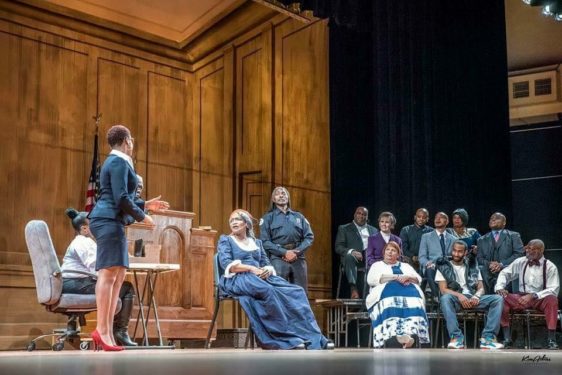By Antonina Zielinska and Katie Engesser

Interracial healing comes to a Brooklyn theater Aug. 26 in the form of a play filled with Gospel-inspired music, laughter, tears and truth.
The drama unfolds in “Justice on Trial: Black Lives Matter, Too” as two attorneys sue the justice department for reparations for the children of American slaves.
“You look at all the things that are happening in and around us – and you know they need to be addressed,” said Phillip Mitchell, actor. “The music will make you laugh. It will make you cry. It brings on emotions that can heal and help you share with other folks.”
Chad Lawson Cooper came up with the idea of the play after hearing of the death of Philando Castile, a motorist killed in Minnesota by a police officer in 2016. The aftermath was recorded by his girlfriend, who was in the car with her 4-year-old daughter.
“We deal with what happened 200 years ago and we’re dealing with what’s happening now,” he said.
Cooper has already had success with his “Church Mess” play, which grossed $16 million over 10 years and 150 cities. That play dealt with the healing of Christians; now he wanted to tackle a problem affecting all people in the United States.
His familiarity with court proceedings, through his past job as an investigator for a law firm, brought on the premise of the play. His devotion to God and his work as an elder of the Church of God in Christ gave the play spiritual undertones, even though it is not explicitly a religious play. Most of the people involved in the play found their roles through their churches.
Cooper said he is also grateful to the Catholics for fighting the good fight and invites all to come, see and experience.
“The Catholic Church has always been a staple in trying to resolve race relations,” he said.
“The Catholic Church has always, always, dealt with trying to heal and put together the community and fix broken things in the community. … I think the Catholic Church would really get something out of this play.”
The premise of the play brings forth three time-traveling witnesses to the stand from the pages of history. Cooper’s wife, Alicia Cooper, plays the role of Harriet Tubman.
“I do a lot of praying before I get on stage,” she said. The part is more than just a job for her.
“We just want other ethnic groups to know how we feel,” she said. “It seems like a lot of our issues in our community are unnoticed. People are not really looking in our homes and seeing what’s going on. It’s like they don’t care.”
Loretta Morabito, who plays a white racist juror, said a lack of understanding is at the core of racism.
In her life she has been around both sides of the conversations many times. In white circles, there are those who simply believe that black people have nothing to complain about and should just go on with their lives like everybody else without expecting special treatment.
In black circles there are those who believe that all white people have some incredible privilege derived from the backs of black slaves that deprives them of the ability to complain about poverty and injustice. She believes that if people would just come to understand where the other side is coming from, racism could lose its edge.
Purpose in Life
Morabito has always tried to be a voice of reason, but didn’t believe there was much else to be done. That is until she came upon a pastor that challenged his congregants. The pastor asked all who did not know their purpose in life to close their eyes and imagine what they hate most.
Racism is what came to Morabito’s mind.
After the pastor asked all to open their eyes, he said it was their purpose in life to fight against whatever had just come to their minds.
She was skeptical at first, thinking God couldn’t possibly expect her to do something so outlandish. But with prayer came understanding and when the call came out for someone white who was willing to say derogatory things to the face of black people to bring forth light upon racism, she knew what she had to do.
“This is my purpose,” she said. “This is something God would have me do.”
The problem must be named, acknowledged and looked upon in light in order for healing to begin, Alicia Cooper said. The play allows people of all ethnicities to proverbially walk in the shoes of black people for an hour and 40 minutes.
Actor Jeremiah Brunson said the play is a great way to experience and understand what happened “way back when” and how it continues to effect the present.
He encourages parents to bring their children so that all may benefit from education through art. Although the topic may be difficult, the play is hopeful and joyful, celebrating the best of humanity while at the same time acknowledging its sins.
“Justice on Trial: Black Lives Matter, Too” will be performed Aug. 26, 3 p.m. at the Roulette Intermedium Theater in Downtown Brooklyn. For tickets, call 212-786-6460. There are going to be additional performances in October in Harlem.

Great Article!
I’m Loretta the one that plays Debbie the racist and I would love to have you see the play. I’m very familiar with your work. I’ve been watching it from the beginning. “School Days” is where I started. It would be my pleasure to have you as a guest in Brooklyn or Harlem or whatever suits you please let me know.